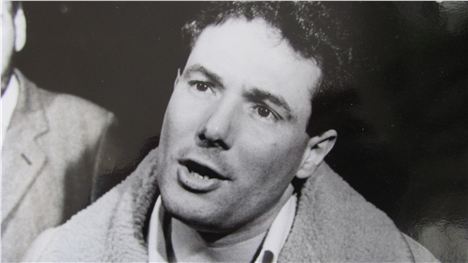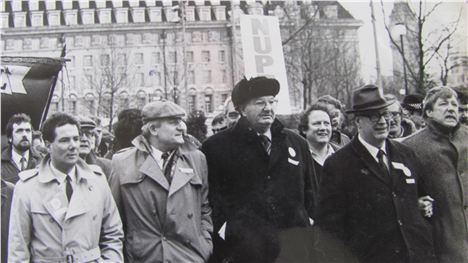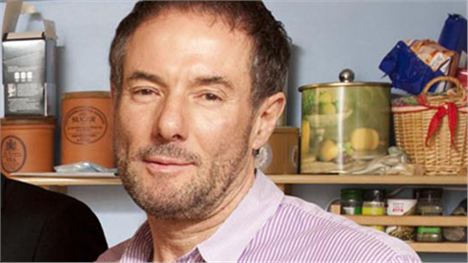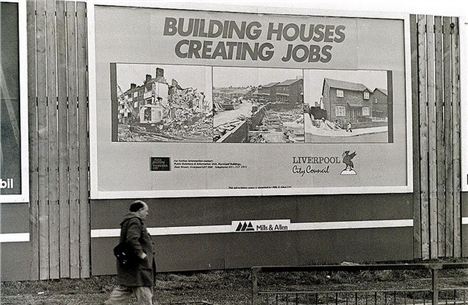THIRTY years ago this week, Liverpool became a virtual people’s republic with the election of a Labour council that was to go down in history.
Just four months after those famous local polls of May 1983, Derek Hatton was chosen as deputy leader of Liverpool City Council.
'We had some polling stations with a turn out of over 70pc. That was unheard of and today in some polling stations you are lucky to get 7pc'
A battle raged, fought out on the pages of the tabloids and the broadsheets, between Degsy’s so-called Militant army and Margaret Thatcher’s Conservative government.
The clarion call on the streets of Liverpool was to protect “jobs and services”, and a campaign began to build council houses, schools and community centres.
Starved of cash from Whitehall, the council embarked on an adventure that led to Hatton and 46 other Labour councillors being banished from office, in 1987, for five years.
A handful of Labour councillors – known, depending on which side of the fence you were on, as the Scabby Seven or the Sensible Seven - kept their seats.
With row upon row of empty Labour benches in Liverpoool, the Liberals regained the control they had lost in 1983. Sir Trevor Jones became leader. The Lord Mayorality (the title had been changed to Chairman by the Labour group) was restored, with Lady Doreen Jones riding through the city in the traditional horse-drawn coach.
In the fullness of time, new elections were held to replaced the sacked politicians and Labour regained control of the town hall. Things, though, would never be the same again.
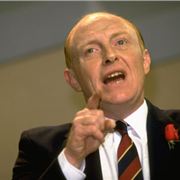 Neil Kinnock has a goIn 1985, the Labour Party Leader Neil Kinnock made his famous-anti-Militant speech at the party’s Bournemouth conference in which he denounced the “grotesque” way (Liverpool) “a Labour council … a Labour council”, sent taxis scuttling around the city delivering redundancy notices to its own workers. The media had a field day.
Neil Kinnock has a goIn 1985, the Labour Party Leader Neil Kinnock made his famous-anti-Militant speech at the party’s Bournemouth conference in which he denounced the “grotesque” way (Liverpool) “a Labour council … a Labour council”, sent taxis scuttling around the city delivering redundancy notices to its own workers. The media had a field day.
Although the Militants were later to admit the stunt was an own goal, the reality is the notices were accompanied with a second letter stating there would be NO job losses. The redundancy notices were red tape, issued so the council stayed within the law during its budget battle with the Government. But why let the facts get in the way of a good story?
Among the banned councillors was the late John Hamilton, leader of the city. Opinion at the time suggested the gentlemanly Hamilton was side-stepped by Militant and the de-facto leader was Hatton. A few years ago, as Hamilton’s life was coming to an end, he sent for me as he lay on his deathbed. He wanted to bury a few ghosts about the Militant years. Hamilton said after the end of the Militant era in Liverpool he never exchanged a single word with Hatton.
So three decades on what does businessman and after-dinner speaker Hatton, make of it all?
LN: If you went back to 1983 would you do anything differently?
DH: It’s a different world, but given the nature of the way the world was then, the way politics was, the way Liverpool was, if it was May 5,1983, the day we took control, I’m not sure I’d do a single thing different.
If it was May 2013 I’m not sure I would do a single thing the same.
Remember, in 1983 when we took over you are talking about the docks shutting, factories shutting, unemployment at an all-time high. You are talking about a Tory government coming in that was already smashing the miners, the steel industry and was smashing local government. So the world was different.
Despite all of that, despite all of the politics, we were still able to do what we did – build 5,000 houses, create thousands of jobs, build schools and nurseries, etc etc. I think we have got a lot to be proud of.
LN: History, well in my book, has been most unkind to that era in Liverpool. At the time the people of Liverpool were right behind what was happening. The turn-out in local elections was massive.
DH: We never lost an election. When we got in in 1983, we were the only city in the country to win from the Liberals and the Tories. And two months later Thatcher won a General Election. There was a mood swing at the time to Tories but we (Liverpool) bucked the trend and went the other way. The reason why we did was the people of Liverpool saw this was worth going for, and they went on voting for us again and again.
We had some polling stations with a turn out of over 70pc. That was unheard of and today in some polling stations you are lucky to get 7pc.
LN: When people talk about a Militant council, only a handful of the councillors belonged to the Militant Tendency.
There was a mood swing at the time
to Tories but we (Liverpool) bucked
the trend and went the other way
DH: It was a left wing Labour council. Yes there were members of Militant, there were members of various factions, but at the end of the day it was a Labour-controlled council. Every member had been a member of the Labour Party for years and years, worked their way through the wards and constituencies. None of them had been parachuted in from anywhere.
We have got only things to be proud of. I say to people in responsible positions “tell me what we did wrong?” And very often they don’t know what to say.
They may say, “well didn’t you bankrupt the city?” We absolutely didn’t bankrupt the city and nobody can tell me what we did wrong. It’s hard for anybody to come up with anything.
LN: Maybe it’s not what you did wrong, it’s maybe what other big cities with similar problems did wrong. If the big cities had stuck together history may have been different.
DH: The only reason the big cities didn’t stick together was the treachery of Neil Kinnock. Until the time of that famous speech in 1985, I used to go up and down the country and speak to thousands of people on rallies. Every Labour leader loved to be on the platform with us.
Those leaders were speaking to thousands of their people. If they called their own meetings they could have held them in telephone boxes. Kinnock all of a sudden saw the power building up all around the country and people were saying “what is Kinnock doing?”. The moment he made that speech not a single Labour leader wanted to be on a platform with us.
'Kinnock didn’t lose general elections
because of our policies, he lost them
on the basis of his policies'
LN: Just a few weeks ago, there was a demo outside Liverpool Town Hall against the bedroom tax. There were about 200 people there. I saw Tony Mulhearn (one of the 47 and former President of Liverpool District Labour Council) and reminded him of the days in the 1980s when there were 50,000 people in front of the Town Hall.
DH: That is the difference, the mood was right. In those days local authorities could become - and were - at the forefront of the fight against the Tory Government and against the cuts. They can’t be these days.
If Mayor Joe Anderson said today he was going to do what they did in the 1980s, by tomorrow the civil servants would be running the city. People have a go at Joe, but I don’t blame him. His hands are tied.
LN: Look around the country now with the welfare reforms and the bedroom tax and you imagine it's rife for public reaction.
DH: I’m sure it is, but it won’t be done through local authorities because the council’s don’t have power any more.
LN: If Margaret Thatcher had not been the Prime Minister, would we have seen the very powerful Derek Hatton.
DH: If it hadn’t been Thatcher, it would have been somebody of her ilk would have emerged. I don’t necessarily think it was about Thatcher the person. That’s why when people asked me if I was glad she had died, I said it’s totally irrelevant to me. I don’t wish any human being to die, but I really, really wish she had never been born. What she personified was what gave the whole country so many problems, devastated so many communities, devastated so many human beings, what destroyed family life in so many ways.
It happened to be her who developed Thatcherism, if it had been a fellow called Smith it could have been Smithism.
LN: Places like Liverpool were hung out to dry and were rife for a reaction. Just as we had a very powerful Prime Minister we needed a very powerful political entity in Liverpool which we did get, in a sense.
'I say to people in responsible positions
“tell me what we did wrong?” And very
often they don’t know what to say'
DH: We still had docks closing, factories closing and massive unemployment, and unless you had a Tory government coming in to give all the money just because they liked Liverpool, that was always going to happen. And I couldn’t see that happening whether Thatcher was there or not. People say did we have to go about it the way we did. It was the way we went about it we got £30m from the government in our first year of being in office and no other city in the country got that.
LN: People say because of what happened in the 1980s the city suffered from that legacy for many years. What do you say to those people?
DH: The expulsions happened and another Labour council took over and they were able to do what they did. Eventually because they didn’t have the policies that we had, the Liberals and Tories took over and they ran the city for years. Remember Kinnock didn’t lose general elections because of our policies, he lost them on the basis of his policies.
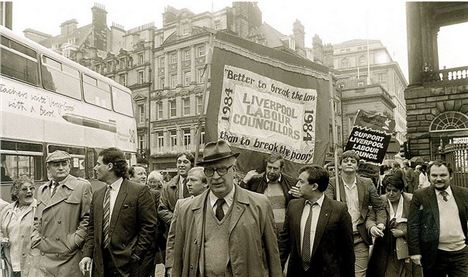 Genial John Hamilton: Leader in name only
Genial John Hamilton: Leader in name only
When Labour regained the city council in 1987 (after the expulsions) they were told by national government what they could do. From then on in people were saying hang on, what are we getting here and eventually Labour lost control. That would never have happened if we had stayed in power.
LN: Are you a member of the Labour Party?
DH: You are the second person to ask me that this week. No I am not. I never rejoined. I have only ever voted Labour but at times I didn’t vote, particularly over Tony Blair and the Iraq War.
LN: So there’s no coming back?
DH: Never say never, but at the moment the answer is correct.
If Milliband really wants a Labour government
to take control he has got to stop listening
to what Daily Mail editorials are saying
LN: If you were giving advice to Joe Anderson or Ed Milliband what would you say?
DH: I don’t know how Joe Anderson would do anything differently than he does now. In the terms of what he is facing he’s probably doing a good job.
Ed Milliband is a different ball game. If he really wanted to, he could behave very differently. If he really wants a Labour government to take control he has got to stop listening to what Daily Mail editorials are saying. He’s got to say I’ve now got to do something about people losing jobs and suffering and losing everything because of this Tory government, and I’ve got to come up with an alternative. At this moment we are not seeing that.
LN: At the moment there is no indication they (Labour) would repeal the bedroom tax.
DH: There’s no indication they would repeal anything, so why would people vote for the same thing? They have to show they are different.
If there isn’t a Labour Party that is different to the Tories people will say why should we vote.
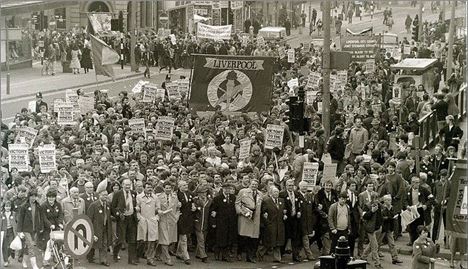 An everyday demo in Liverpool would attract tens of thousands
An everyday demo in Liverpool would attract tens of thousands
LN: As you go around the country and meet people you are often portrayed as a political bogeyman. Do they see Derek Hatton in a different light?
DH: Of course they do. I can’t write what the editorials have been writing for 30 years. All I hope as time goes on, and particularly with the 30th anniversary people will start some of the truths behind those lies.






